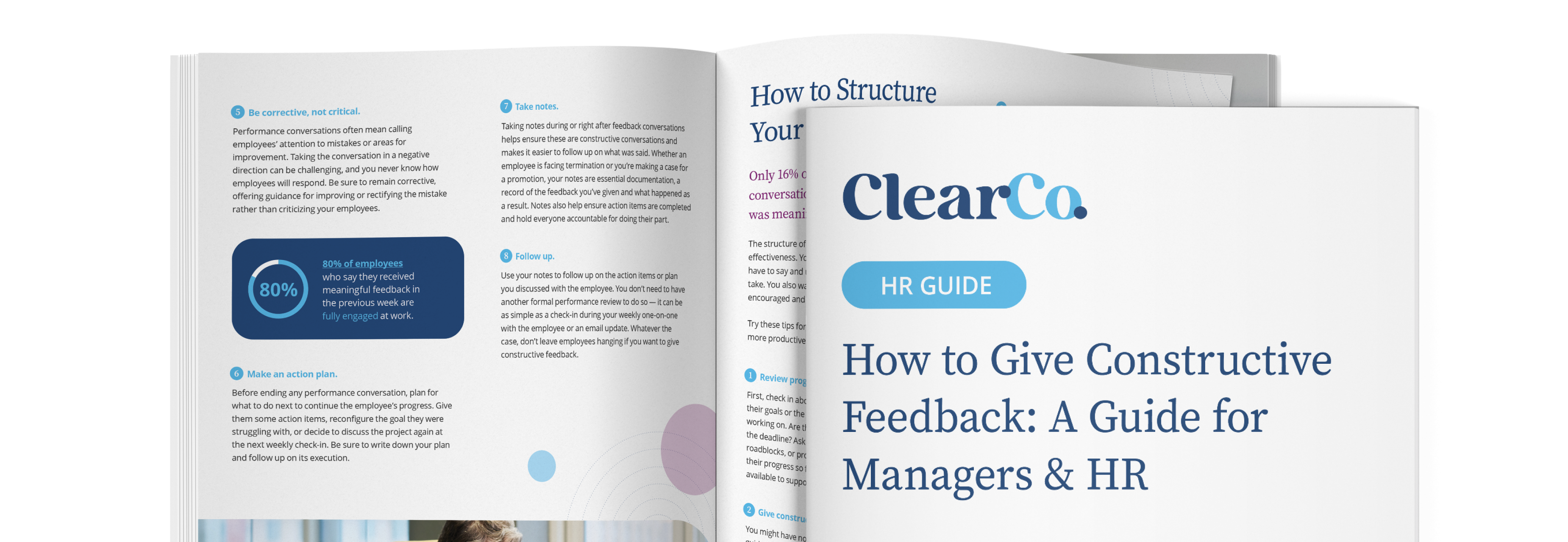It’s no surprise that a competitive salary leads the list of benefits employees care about most. Compensation is a crucial factor in attracting, engaging, and retaining your top talent, which means it’s a top priority for HR at all times. But managing compensation is no small task — it’s one of your team’s most complex, high-impact responsibilities.
This year, compensation management is also a key concern for 44% of employers. That means your HR team is under pressure to ensure your practices are equitable and effective. You want everyone to be paid fairly and competitively enough to keep them at your company, and offer pay and benefits that entice job seekers. You also have a bottom line to consider.
One approach to determining compensation is performance-based pay. Linking performance to compensation can be motivating and drive results. But it also comes with challenges, like bias in evaluations and difficulties in execution.
Keep reading to explore the pros and cons of linking pay and performance. We’ll also share some actionable tips for implementing performance-based compensation.
What Does It Mean to Link Compensation and Performance?
Aligning compensation and performance management strategies means decisions about pay are directly impacted by employee performance. This compensation philosophy aims to make a clear connection between the work each person does and the compensation they receive. Rewarding individual performance is considered an effective strategy by a vast majority of companies — 93% offer some form of incentive pay.
Whether performance impacts bonuses, raises, or other benefits, when done well, this strategy can motivate employees to do their best. Here are a few examples of how companies pay for performance:
- Performance-Based Variable Pay: Employees receive performance bonuses or incentives if they meet or exceed their goals. For example, a salesperson earns commission based on the number of new clients they secure each quarter.
- Merit Pay Systems: Annual raises or salary adjustments are determined based on an employee’s performance review. A high-performing employee who continually goes above and beyond would receive a larger merit increase than colleagues who are meeting expectations.
- Profit-Sharing Plans: Employees earn a percentage of the company’s profits based on both the organization’s success and their individual or team contributions. This rewards strong performers and fosters a sense of shared responsibility.
- Goal-Driven Rewards: Specific rewards — like bonuses, stock options, or pay increases — are tied to the achievement of strategic goals, like completing a major project ahead of schedule or exceeding a customer satisfaction target.
To be sure performance-based compensation decisions feel fair and actually motivate your people, fair implementation of the strategy is essential. You need a transparent compensation planning process and clear metrics that define success to make this strategy work.
The Pros & Cons of Performance-Based Compensation
Recent data shows that 31% of organizations cite unfair pay as the leading reason they’re losing talent. Performance-based compensation can address this concern by rewarding employees based on their contributions, but it’s not a one-size-fits-all solution.
Before you drop a new compensation strategy on your team members, consider the benefits and downsides of this approach.
Pros
- Boosts Employee Motivation and Accountability: With their efforts tied directly to their pay, employees are driven to exceed expectations.
- Supports a Performance-Driven Culture: When employees’ goals are aligned with business goals, everyone can see that when they’re doing well, the company does well.
- Promotes Talent Retention: Companies often retain more employees with compensation management based on performance because top performers feel recognized and valued for their work.
- Drives Transparency: Pay for performance means HR professionals and company leaders have to work together to create clear metrics for success and pathways for growth. When employees can see what it means to knock it out of the park and what they need to do to advance, your strategy promotes fairness and encourages excellence.
Performance & Compensation Management for HR
Cons
- Bias Risks: Subjective evaluations can hurt perceptions of fairness. Be sure you have robust evaluation criteria in place to avoid bias impacting pay-for-performance compensation decisions.
- Complexity in Execution: It’s no easy task to accurately measure performance across every role and apply pay decisions consistently. That is, unless your organization uses a performance management system with compensation tools.
- Focus on the Short-Term: Compensation packages dictated by performance might mean some employees prioritize the measurable tasks that impact those decisions. They might focus on completing short-term goals over long-term strategic goals or collaborative efforts that don’t have the same measurable outcomes.
5 Tips for Successfully Linking Performance and Compensation
Tying compensation to performance effectively requires structure and transparency. You need to set clear performance metrics and create well-defined evaluation criteria to avoid biased outcomes. Using technology to deliver your performance management process streamlines progress tracking and helps you make informed pay decisions. That means less work for your team and more accurate pay adjustments for your people.
Check out these tips to make performance-based compensation successful:
- Align Compensation to Measurable Outcomes: Your employees need clear, achievable metrics, or they’ll find this approach frustrating instead of motivating. Create a structured framework for rewards — e.g., if a customer service representative resolves 90% or more of open tickets within 24 hours each quarter, they receive 100% of their bonus.
- Invest in Training for Managers: Only 59% of organizations train managers on how to have pay conversations. Don’t cause confusion with vague statements about how pay is determined. Train managers on how to present the compensation philosophy and on how to give out rewards.
- Leverage Software: Performance management software that includes compensation planning tools will simplify this strategy and help you improve transparency. The connected systems mean you can easily look at performance data and share the reasoning behind pay decisions.
- Encourage Continuous Feedback: Be sure managers are discussing performance with their direct reports on a regular basis. If employees rarely get feedback on how they’re doing, they’ll likely feel that performance-based pay is unfair. The good news is that your people want to talk about it — 80% prefer continuous feedback.
- Communicate Clearly with Employees: Transparency is key with this strategy. Don’t let employees guess about how pay is determined. Share your compensation management strategy by outlining how performance metrics, goals, and rewards are aligned. When employees understand how decisions are made, it builds trust and reduces concerns about favoritism.
When the link between compensation and performance is clearly defined, you can create a culture where employees feel motivated, valued, and connected to company goals. Focus on measurable outcomes, train managers for unbiased evaluations, and maintain open communication to minimize risks and ensure success with pay-for-performance.
Start small, stay flexible, and you’ll be well on your way to creating a fair and effective system that fuels growth both for your people and for the business.
Connect Compensation and Performance With ClearCompany
Are you ready to rethink how your organization rewards performance? Performance-based pay is simple with ClearCompany. We built connected Performance and Compensation Management so you can rely on your data and ditch the guesswork. Compare employee performance with ease, set fair, data-driven pay, and build trust with a system that’s transparent from the get-go.
ClearCompany has your back with tools that connect the dots, so you can focus on building a motivated, high-performing team.
Ready to upgrade the way you reward success? Get started with ClearCompany Compensation Management.

.png)
